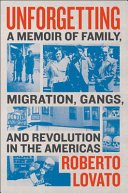Unforgetting: A Memoir of Family, Migration, Gangs, and the Revolution in the Americas

Top of the pile
82
/100
I Index Overall Rating

Readers
Critics
Scholars
N/A
Author:
Roberto Lovato
Publisher:
Harper
Date:
September 1, 2020
A tale of gang life, guerrilla warfare, intergenerational trauma, and interconnected violence between the United States and El Salvador, Roberto Lovato's memoir excavates family history and reveals the intimate stories beneath headlines about gang violence and mass Central American migration.
What The Reviewers Say
Carolyn Forché,
The New York Times Book Review
The New York Times Book Review
...groundbreaking.
Alexis Terrazas,
San Francisco Chronicle
San Francisco Chronicle
With the precision of a master seamstress — not unlike that of his paternal grandmother, Mamá Tey, who migrated from El Salvador with the money earned courtesy of her iron Singer sewing machine — Lovato braids a narrative that spans nine decades and weaves together El Salvador’s history of genocide, civil war, revolution and migration with his family’s own.
Laura Weiss,
The New Republic
The New Republic
... determined to unravel the many stereotypes that outsiders like Didion have perpetuated about the country, to make room for new insights about the trauma that generations of Salvadorans have endured.
Kyle Paoletta,
The Nation
The Nation
... a memoir that situates his family’s story within the broader history of what he dubs 'the tiny country of titanic sorrows,' Lovato describes a personal awakening to El Salvador’s century-old cycle of violence, the process that prompted his turn to journalism as a means of grappling with the scale of the nation’s trauma.















